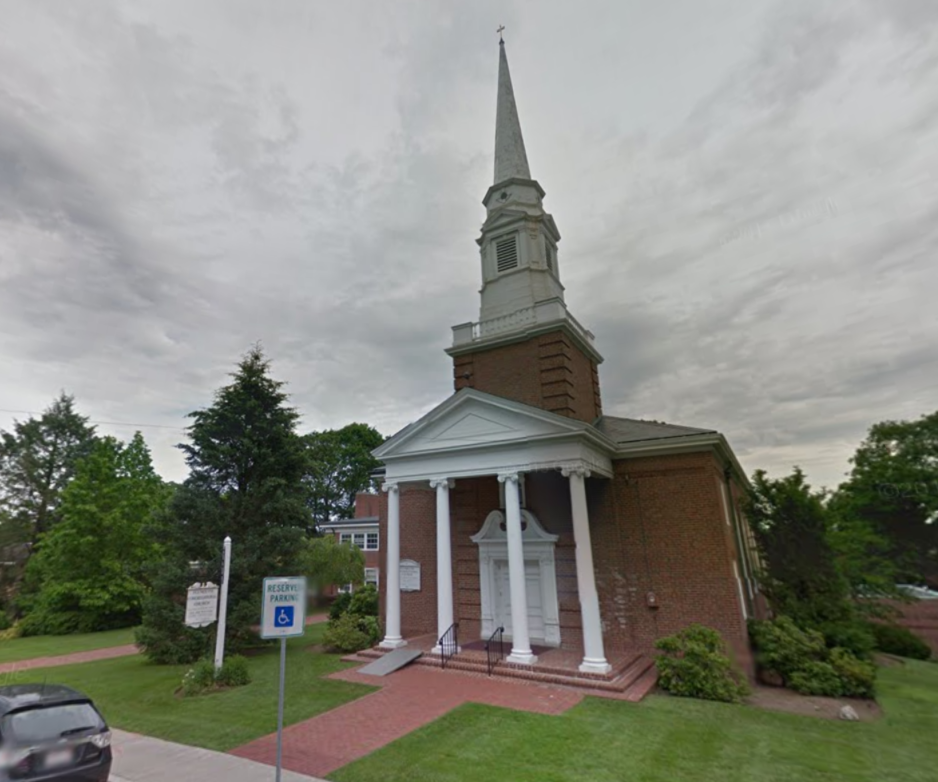Photo: Plymouth Congregational Church.
By a 2-0 vote with one abstention, the Belmont Board of Selectmen will recommend “favorable action” on a citizen’s petition seeking to require firms seeking to install interior cellular transmission antennas to obtain a Special Permit from the Zoning Board of Appeals.
A Special Town Meeting will be held on Wednesday, June 9, to vote on the article.
The vote, taken on Friday, June 3, will bolster the efforts of more than 200 residents along Pleasant Street, who have been fighting to stop the telecommunications giant Verizon from installing six antennas within the steeple of Plymouth Congregational Church, at 582 Pleasant St.
Selectmen Jim Williams and Sami Baghdady voted for a favorable review. Chair Mark Paolillo recused himself as he, as a member of the Plymouth congregation, had been involved in a minor way at the beginning of the negotiation between the church and Verizon.
Judith Sarno, a Waverley Terrace resident who has been assisting the residents in crafting the petition and who presented the case before the board, said the article’s proponents are only seeking “just a little more opportunity for transparency, and that’s important for the residents.”
Under existing bylaw, an interior antenna is a “by right” installation, requiring only a design and site review from the Planning Board, which is not obliged to provide a public comment period – although, in practice, the Board does accept comments from residents – or the notification of neighbors.
A Special Permit process would require an open meeting where comments and testimony are provided to the ZBA, which can require more information on the effects of the equipment on the steeple and answers from the applicant on a broad range of criteria.
“That could include noise, servicing trucks, certainly its height,” said Baghdady.
One area the current opponents will be unable to question the application of the Special Permit process are health concerns emulating from the tower. For the past year, residents against the antenna have been presenting a broad range of data and science alleging great rates of cancer and other harmful impacts from the location at the church.
But Jeffrey Wheeler from the town’s Office of Community Development told the board that cell antennas “is heavily, heavily regulated by the Federal Communications Commission. The issue of health concerns can not [be part] of the review.”
“For example, if the town said ‘no’ due to health concerns, that will make that decision ripe for a lawsuit,” said Wheeler.
What appeared to sway the selectmen Friday were recent votes by Town Meeting in Arlington and Lexington to add the Special Permit requirement in their towns.
“The argument could be made that it’s … good risk management to elevate the level of the process. And it shows the town does its due diligence,” said Sarno.
“I believe that this article will allow residents to vent their frustrations and increase the chances both sides can come to a mutually agreed to solution,” said Paolillo.
In recent years, the Zoning Board of Appeals has been seen as increasingly hostile to commercial interests, opposing the building of a boutique hotel, a Dunkin’ Donuts franchise and a day care facility while having voted to restrict the number of days residents can rent their homes on the popular site Airbnb.
While voting for passing the “favorable action” measure, the Selectmen did not appear to believe a Special Permit process would unduly delay the issuance of the permit and subsequently a building permit for
“We were told the difference between a normal permit and a Special Permit depending on the substance, could be business as usual,” said Jim Williams, noting advice from Planning Board Chair Elizabeth Allison.
At Friday’s meeting, Sarno introduced an incentive for the town to become directly involved in the process, revealing a plan by the residents to require Verizon to indicate if a town-owned building “that might be suitable.”
“And there the town would get the money,” said Sarno. She pointed to an annual revenue of $43,900 from two cell facilities, on the Belmont Police Headquarters on Concord Avenue and the exterior tower on upper Concord Avenue across from Somerset Street.
What all sides did agree is that approving the requirement of a Special Permit will increase the chances of litigation from either the carrier or the residents depending which way the ZBA decides.








Leave a Review or Comment